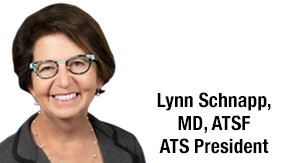I have the honor of representing ATS, along with our CEO Karen Collishaw, in the new “Equity Matters” program, an 18-month initiative organized by the Council of Medical Specialty Societies and the Accreditation Council for Graduate Medical Education. The Equity Matters program centers around continuous learning and process improvement in the areas of diversity, equity, and inclusion (DEI) and anti-racism practices.
As part of the program, each of us were asked to examine our society’s early history, with an eye towards identifying unrecognized racist policies or disparities. Our society was founded in 1905 by Edward Trudeau, who devoted his career to the treatment and study of tuberculosis (TB) and established the Adirondack Cottage Sanatorium at Saranac Lake, NY. As we dug deeper into our beginnings, we discovered a number of structural factors that impacted who was able to receive care at his sanatorium. While basic treatment was free, individuals had to bear the cost of travel to upstate New York. Furthermore, only patients in the early stages of TB were admitted to the sanatorium. As such, care was disproportionately available to white people with means. Thus, unequal access to care has been part of our founding history. The program highlights how important it is to recognize and address these issues of historical bias to improve access in the future.
factors that impacted who was able to receive care at his sanatorium. While basic treatment was free, individuals had to bear the cost of travel to upstate New York. Furthermore, only patients in the early stages of TB were admitted to the sanatorium. As such, care was disproportionately available to white people with means. Thus, unequal access to care has been part of our founding history. The program highlights how important it is to recognize and address these issues of historical bias to improve access in the future.
As part of this project, ATS leadership completed a “readiness” assignment, in which we examined our current DEI initiatives and identified opportunities and challenges to further integrate DEI into our Society. Our current ATS Policy on Diversity and Inclusion, approved by our Board of Directors in 2018, explicitly states “a core value of the ATS is to attain the highest level of respiratory health for all people. Achieving health equality requires placing equal value on all people, as well as implementing and maintaining focused societal efforts to address avoidable inequalities, along with historical and contemporary injustices. Diversity and inclusion are critical to achieving health equality.” We created the Health Equity and Diversity Committee in 2013 which is staffed by Mr. Courtney White, CAE, our senior director of Patient Outreach, Equity and Engagement. The Committee recently initiated a mentoring program for ATS members who are underrepresented in medicine.
ATS provides a fellowship in health equity, ensuring grants go to those underrepresented in medicine, and joined with CHEST in 2020 to award grants for studying COVID disparities. In addition, the ATS has joined with both CHEST and the ALA to create two multi-year awards to focus on under-represented researchers and disparities/inequities in pulmonary medicine. We’ve also recently initiated a new Health Equity and Diversity fundraising effort to support relevant ATS activities along with partnering again with CHEST and the ALA to support a Harold Amos Medical Faculty Development Program fellow in pulmonary/critical care/sleep medicine, in the near future. If you’re interested in supporting these efforts, you can make your gift here: https://research.thoracic.org/donate/index.php.
Yet we still have much more work to do in this domain. The diversity of ATS membership and leadership, while making strides over the past decade, is still a work in progress. Our workforce needs to reflect the demographics of our communities. To help us understand the impact of our initiatives, we encourage members to answer the race and ethnicity question that accompanies membership renewal and meeting registrations. We have just begun to uncover the prevalence of assumptions of race and ethnicity that have been incorporated into our-day to-day clinical practice, and how those assumptions may adversely impact communities of color. ATS recently convened a workshop, “Race/Ethnicity in Pulmonary Function Testing,” and a full report is expected later this month. The Health Equity and Diversity Committee, in concert with the ATS Executive Committee, are working on an ATS DEI Roadmap. The DEI Roadmap is just the beginning of our journey, much work lies ahead of us to ensure that we fulfill our goal “to attain the highest level of respiratory health for all people.” I will end with one of my favorite quotes from the Talmud, “The day is short. This task is difficult. It is not our duty to finish it, but we are forbidden not to try.”

